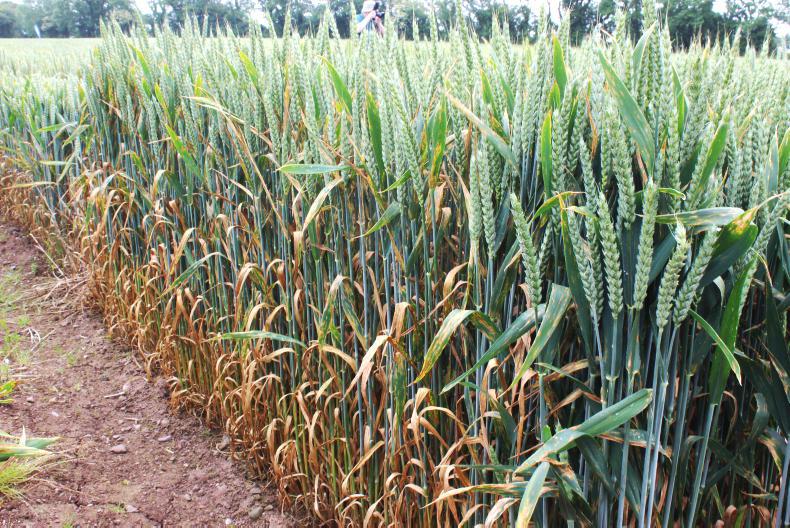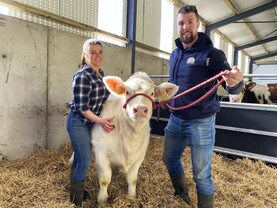For over three decades, septoria tritici has been recognised as the most economically destructive disease of Irish winter wheat crops. During this period, control has relied heavily on the timely application of fungicides.
However, the pathogen Zymoseptoria tritici has demonstrated a continuous ability to overcome these fungicides through the development of resistance.
As the availability of fungicides is restricted through regulation, the role of varietal resistance in managing the disease is becoming increasingly important.

We will need an improved knowledge of the basis of genetic resistance to help guide better variety choice.
Substantial improvements in varietal resistances have been made over the past two decades and many varieties that were grown in the late 1990s and early 2000s would now be deemed as susceptible to septoria.
However, as is the case with fungicides, Z. tritici has also shown the capacity to overcome genetic resistances, especially those that rely heavily on single genes or sources.
Therefore, it is increasingly important to understand the diversity of the Irish Z. tritici population, especially regarding how widespread specific virulences are to key resistance sources.
This is essential to ensure that varietal resistance is deployed in a way that minimises its risk in the wider population.
Checking sample virulence
Z. tritici collections have been established through a combination of intensive and extensive sampling of commercial crops and trial plots. We can use these collections to evaluate their virulence to key resistance sources.
These are being further investigated through detailed genomic analysis, with the aim of aiding their rapid detection in field populations.
The story with Cellule
Virulence to key resistance sources was detected in the Irish Z. tritici population in both 2019 and 2020. In each case, this was confirmed through inoculation under glasshouse conditions.
Specifically, strains of Z. tritici overcoming the resistance conferred by the Stb16q gene in the variety Cellule in 2019 were detected in different locations, both in trial plots and commercial crops.
These strains were extremely specific to Cellule. In 2020, strains that were able to overcome the resistance present in the variety Cougar were also detected.
Cougar has been used as a parent in breeding programmes and these same strains were able to overcome the resistances present in a number of its progeny, currently under evaluation as part of the recommended and national list trials conducted by the Department of Agriculture.
Virulence knowledge to affect variety choice
As varietal or genetic resistance is one of our key means of preventing and suppressing initial infection, disease development and subsequent control measures, it is important to ensure that varietal resistance remains robust.
As well as variety evaluation trials, our ability to confirm the virulence profile of Irish Z. tritici will aid decisions on disease risks associated with growing specific varieties.
For over three decades, septoria tritici has been recognised as the most economically destructive disease of Irish winter wheat crops. During this period, control has relied heavily on the timely application of fungicides.
However, the pathogen Zymoseptoria tritici has demonstrated a continuous ability to overcome these fungicides through the development of resistance.
As the availability of fungicides is restricted through regulation, the role of varietal resistance in managing the disease is becoming increasingly important.

We will need an improved knowledge of the basis of genetic resistance to help guide better variety choice.
Substantial improvements in varietal resistances have been made over the past two decades and many varieties that were grown in the late 1990s and early 2000s would now be deemed as susceptible to septoria.
However, as is the case with fungicides, Z. tritici has also shown the capacity to overcome genetic resistances, especially those that rely heavily on single genes or sources.
Therefore, it is increasingly important to understand the diversity of the Irish Z. tritici population, especially regarding how widespread specific virulences are to key resistance sources.
This is essential to ensure that varietal resistance is deployed in a way that minimises its risk in the wider population.
Checking sample virulence
Z. tritici collections have been established through a combination of intensive and extensive sampling of commercial crops and trial plots. We can use these collections to evaluate their virulence to key resistance sources.
These are being further investigated through detailed genomic analysis, with the aim of aiding their rapid detection in field populations.
The story with Cellule
Virulence to key resistance sources was detected in the Irish Z. tritici population in both 2019 and 2020. In each case, this was confirmed through inoculation under glasshouse conditions.
Specifically, strains of Z. tritici overcoming the resistance conferred by the Stb16q gene in the variety Cellule in 2019 were detected in different locations, both in trial plots and commercial crops.
These strains were extremely specific to Cellule. In 2020, strains that were able to overcome the resistance present in the variety Cougar were also detected.
Cougar has been used as a parent in breeding programmes and these same strains were able to overcome the resistances present in a number of its progeny, currently under evaluation as part of the recommended and national list trials conducted by the Department of Agriculture.
Virulence knowledge to affect variety choice
As varietal or genetic resistance is one of our key means of preventing and suppressing initial infection, disease development and subsequent control measures, it is important to ensure that varietal resistance remains robust.
As well as variety evaluation trials, our ability to confirm the virulence profile of Irish Z. tritici will aid decisions on disease risks associated with growing specific varieties.







 This is a subscriber-only article
This is a subscriber-only article










SHARING OPTIONS: